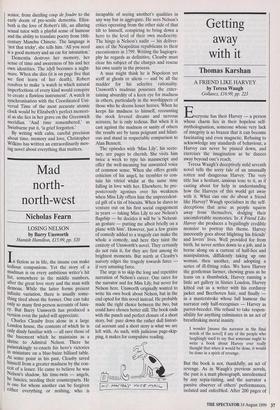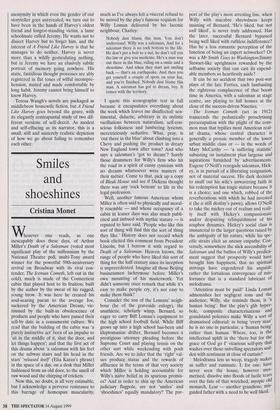Getting away with it
Thomas Karshan
A FRIEND LIKE HARVEY by Teresa Waugh Gollancz, £16.99, pp. 223 Everyone has their Harvey — a person whose charm lies in their hopeless self- mythologisation, someone whose very lack of integrity is so brazen that it can become fascinating and even magnetic. Refusing to acknowledge any standards of behaviour, a Harvey can never be pinned down, and exercises the imagination as he dances away beyond one's reach.
Teresa Waugh's deceptively mild seventh novel tells the sorry tale of an unusually rotten and dangerous Harvey. The very title has a hesitant, anxious tone to it, as if casting about for help in understanding how the Harveys of this world get away with it. What can one do about a friend like Harvey? Waugh specialises in the self- deceptions that arise as people squirm away from themselves, dodging their uncomfortable memories. In A Friend Like Harvey she produces a beguilingly credible monster to portray this theme. Harvey innocently goes about blighting his friends' and lovers' lives. Well provided for from birth, he never settles down to a job, and is borne along on a current of half-lies and manipulation, diffidently taking up one woman, then another, and adopting a series of ill-fitting roles. We have Harvey the gentleman farmer, chewing grass as he leans on a thumbstick, Harvey running a little art gallery in Sixties London, Harvey kitted out as a writer with his corduroy jacket and Beethoven hair, and finally — in a masterstroke whose full humour the narrator only half-recognises — Harvey as parrot-breeder. His refusal to take respon- sibility for anything culminates in an act of breathtaking moral inanity.
I wonder [muses the narrator in the final words of the novel] if any of the people who laughingly used to say that someone ought to write a book about Harvey ever really thought that when it would be done, it would be done in a spirit of revenge.
But the book is not, thankfully, an act of revenge. As in Waugh's previous novels, the past is a matt photograph, unredeemed by any sepia-tinting, and the narrator a passive observer of others' performances, isolated and enfeebled. After 200 pages of anonymity in which even the gender of our storyteller goes unrevealed, we turn out to have been in the hands of Harvey's oldest friend and longest-standing victim, a lame schoolmate called Jeremy. He wants not to dissect Harvey but to forget him, and the interest of A Friend Like Harvey is that he manages to do neither. Harvey is never more than a wildly gesticulating nothing, but in Jeremy we have an elusively subtle portrait of memory going nowhere. His static, fastidious thought processes are ably registered in flat tones of wilful incompre- hension, muted and made comfortable by long habit. Jeremy cannot bring himself to know Harvey.
Teresa Waugh's novels are packaged as middlebrow housewife fiction, but A Friend Like Harvey goes beyond the genre, with its elegantly contrapuntal study of two dif- ferent versions of self-deceit. As modest and self-effacing as its narrator, this is a small, still and austerely realistic depiction of how we go about failing to remember each other.



























































 Previous page
Previous page